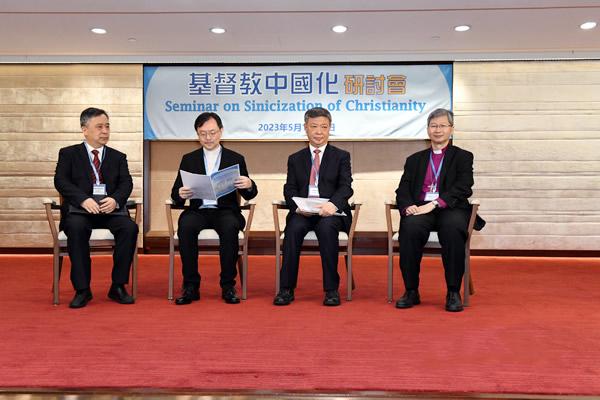CCC&TSPM and the Hong Kong Christian Council jointly hosted a symposium on the sinicization of Christianity in Hong Kong.
The symposium was held at the YMCA of Hong Kong Hotel on May 18th and 19th, and it was attended by more than 120 people from major Christian denominations, seminaries, and social service organizations in Hong Kong, in addition to the Chinese Christian delegation comprising of 24 people, including five scholars, according to CCC&TSPM.
During the opening ceremony on May 18th, Rev. Wong Ka Fai, chairman of the Hong Kong Christian Council and general secretary of the Hong Kong Council of the Church of Christ in China, pointed out in his speech that the contextualization of Christianity in China aimed to help Christianity take root in China and become an integral part of China. Andrew Chan Au-ming, primate of the Anglican Church of Hong Kong and member of the National Committee of the Chinese People's Political Consultative Conference of Hong Kong, delivered a prayer of benediction.
The symposium's keynote speeches, "Sinicization of Christianity" and "Epochal Character of Sinicization of Christianity," were presented by Milton Wai-yiu Wan, emeritus professor of the Chinese University of Hong Kong, and Rev. Xu Xiaohong, the chairman of the China Three-Self Patriotic Movement (TSPM), respectively. Wan elaborated on the sinicization of Christianity and its theological construction efforts, emphasizing that it should not only adapt to the needs of the times and challenges of the current situation but also explore the "ultimate concern" with long-standing values. It should also take the excellent traditional Chinese culture as a carrier to bless contemporary people. Rev. Xu traced the origin of the promotion of Christianity in the Chinese context and explained that the sinicization of Christianity was a requirement and choice for Christianity's development in China. He emphasized that the indigenization and contextualization of Christianity in China were not intended to change Christian beliefs but to emphasize that Christianity must have Chinese characteristics. Xu also pointed out that the future direction was the sinicization of theological thought and better operation of the church in the context of a socialist society to honor God and benefit people. These concepts could provide some reference for the development of universal churches, especially churches in third-world countries.
Following the keynote speeches, another 14 pastors and scholars from mainland China and Hong Kong conducted discussions and exchanges around the three sub-themes of "Mission and Pastoral Care," "Theological Education," and "Church History." The content of the seminar included research on prominent figures in the history of Christianity in China, case studies on pastoral practice and theological education in China, and theoretical discussions based on comparative religion.
- Translated by Abigail Wu












